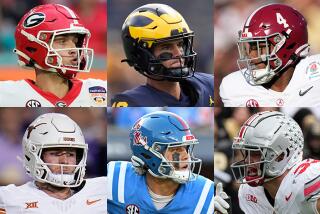Buffaloes No Longer Extinct : McCartney’s Wishbone Has Colorado on the Run Again
When members of the University of Colorado football team woke up in strange beds this morning, they may have been tempted to look out the hotel window just to make sure. Yep, this really is Orange County, home of Anaheim Stadium and the Freedom Bowl, where the Golden Buffaloes are set to meet the University of Washington Monday night.
Colorado in a bowl game. Imagine.
Eight years have passed since the Golden Buffs last appeared in a postseason bowl--the 1977 Orange Bowl, in which Colorado was a 27-10 loser to Ohio State.
Seven years have passed since Colorado had a winning record.
Four years have passed since the final chapter of the Chuck Fairbanks Fiasco, in which the coach, whose lack of charisma turned off the populace, finally skipped town after leaving the football program in total ruin while helping plunge the Colorado athletic program into $1-million debt.
And one year has passed since the Buffaloes nose-dived to 1-10, a season marred by personal tragedy and off-the-field controversy--a season that boosters and officials most kindly describe as an ordeal.
What a long, strange trip it’s been.
And serving as tour guide every step of the way since June 9, 1982, has been Bill McCartney, 45, who has gone from miscast as head coach to messiah in less than 12 months. A 7-4 record, fashioned largely due to a radical change in offensive philosophy, earned McCartney UPI’s Big Eight coach-of-the-year award in 1985.
“It’s a fickle game,” McCartney says.
The coach of the year shrugs. Memories in this game may indeed be short--caused by a form of amnesia heightened by the condition alumni dissatisfactus --but McCartney remembers.
He remembers, only five months ago, when he was ridiculed for scrapping his pass-crazy offense (“The BYU of the Big Eight”), moving his freshman tailback to quarterback and adopting, of all things, the wishbone. This was the same Colorado team that finished dead last in the NCAA in rushing yardage in 1984. Critics laughed. “Make-A-Wishbone,” they called it.
But McCartney went out anyway and grounded the Buffaloes’ attack. Mark Hatcher, the new quarterback, attempted only 51 passes in all of 1985. In 1982, Colorado threw more times in one game--52 against Kansas State.
But land travel was apparently the way to go for the Buffaloes. Colorado grabbed ahold of the wishbone and went from 1-10 to 7-4, from last place in the Big Eight to a tie for third, from last in the NCAA in rushing to ninth (260 yards per game).
“We were 1-10,” McCartney offers by way of explanation. “At that point, we were ready to sink our teeth into something new.”
Kind of like how the Colorado athletic department was ready for something new in 1982, after Fairbanks had taken all the teeth out of the Buffalo football program.
McCartney remembers when he was hired off Bo Schembechler’s coaching staff at Michigan four years ago to salvage what he could from the awful mess left in Fairbanks’ wake. He remembers how dire the straits were at Colorado then.
“The cupboard wasn’t bare when Mac took over,” one Colorado official said. “It wasn’t even built.”
McCartney inherited a team that had won but five games in three seasons under Fairbanks. What’s more, the football program had lost money (due mainly to Fairbanks’ bills: $50,000 for a new office, $650,000 for a remodeled team house), players (only 73 left on scholarship because of academic ineligibilities) and the support of the community.
When Fairbanks jumped at the lure offered by the New Jersey Generals of the United States Football League, Colorado sought more than a head coach as a replacement. A salvage specialist was more like it--someone who could sell Buffalo football, who could re-open lines of communication with an alienated press and a turned-off public, who could recruit student athletes who passed all their classes and didn’t get suspended for stealing textbooks or shooting BB guns at classmates.
The Buffaloes came up with the name McCartney, a former All-Big Eight linebacker at Missouri who spent five seasons (1977-81) as defensive coordinator at Michigan. His background was defense and Colorado, which had allowed 451 points in 1980 and 322 in 1981, liked that a lot.
McCartney is also an outgoing personality, good with the press, and a staunch churchgoer who believes in traditional values, such as college athletes graduating from college. Colorado liked that a lot, too.
Most of all, McCartney could recruit. The man who got Anthony Carter and Stefan Humphries to leave the warm Florida sunshine for the snow drifts of Ann Arbor, McCartney was named one of the top five college football recruiters in the nation by Inside Sports magazine in 1981.
Colorado really liked that. The decision came down during the spring of 1982: The Fairbanks Error was out, McCartney Era was in.
For two years, all was well. McCartney deployed a wide-open passing offense that was exciting, if not overwhelmingly successful, as the Buffaloes went 2-8-1 in 1982 and 4-7 in 1983. Progress was slow, but at least it was progress. And besides, McCartney seemed like a good guy. Colorado would give him time.
Then came 1984.
The Buffaloes lost their first two games, one on a missed field goal with 22 seconds left against Michigan State and the other to a fourth-quarter rally by Oregon. In the Oregon game, Colorado also lost its best player, tight end Ed Reinhardt, to a near-fatal head injury. Reinhardt suffered a blood clot on the left side of his brain and, despite immediate surgery to remove the clot, spent the next two months in a coma.
The effect on the Colorado football team was devastating. Reinhardt has since begun rehabilitation in a Denver hospital, but during those first tense weeks in the fall of ‘84, his teammates were emotionally devastated.
“Here you had a kid who was the perfect example of what we were trying to build,” McCartney said. “He was an outstanding player, a superb student, a tremendous young man . . . and with one swift move, he was fighting for his life.
“No one can weigh or measure the impact that had on our season. We lost a great player, a potential All-American, someone the entire team respected. So many kids were so close to him, so attached to him, that it became very difficult emotionally.”
Crushed, the Buffaloes lost their next three games by scores of 55-14, 33-16 and 52-7. Before they knew it, they were 1-10--with only a two-point victory over Iowa State separating them from a winless season.
Suddenly, McCartney wasn’t so smart. Maybe this nice-guy stuff wasn’t all it was cracked up to be. They finish last, don’t they?
And maybe McCartney’s recruiting strategy was wrong-headed and naive. McCartney sought out “quality people”--running backs with grade-point averages higher than their rushing averages. For a while, that had been a nice change from the types who dotted Fairbanks’ rosters, but maybe now, couldn’t ol’ CU stand for a couple of 4.4 sprinters who knew their way to the end zone but couldn’t necessarily spell it?
Wide receiver Loy Anderson said as much following the Buffaloes’ 10th loss of 1984, calling for McCartney to recruit “tough guys with fire” instead of boy-next-door types.
Then, too, McCartney’s religious beliefs came under the microscope. McCartney, who once considered the priesthood, wears his theology on his sleeve--he calls himself a “born-again Catholic” and will gladly recount the day he saw the light in August of 1974. He reads Scripture every day, attends Mass three times a week and, during his first three years at Colorado, held optional prayer and Bible study groups for his staff and players.
This, and more, was covered extensively in an article entitled “God and the Gridiron,” which appeared in the Boulder Daily Camera’s Sunday magazine last December. McCartney suddenly had a problem.
The story quoted McCartney as saying, “Religion affects every area of my life,” and took a look at how it also affected the Colorado football program. Players were interviewed, and several talked about how they enjoyed saying grace before team meals. They talked about the pregame prayers and the religious dialogue with Coach McCartney.
But, there were dissenters.
Alan Chrite, a senior linebacker in 1984, said players could earn preferential treatment from McCartney if they, too, professed Christian ideals. Alexander was also quoted, saying that certain players felt pressure from McCartney to adopt his line of thinking.
The article sufficiently stirred up the Boulder chapter of the American Civil Liberties Union. As a response, the ACLU filed a letter of protest to the university and launched a preliminary investigation into the football program. No violations were uncovered, but the university nonetheless adopted a policy last August that prohibited all religious activities conducted by coaches, including pregame prayer and Bible readings.
“We can’t even have a moment of quiet before games,” fullback Eric McCarty said. “I think it’s ridiculous. Ask any major college in the country and I’m sure none have the rules.
“Once in a while, Coach McCartney would talk to us about David and Goliath. He did that before the Oklahoma game, which I thought was appropriate. Now, he can’t even do that.”
Says McCartney: “This is an age of unrest. Anybody who takes a stand these days is going to come under attack.
“I enjoy sharing my faith and I have committed my life to Jesus Christ. But because I am zealous and outspoken in my faith, people have wondered if I am creating an imposition on my players. I never felt I was, but if a kid says he is feeling pressure, then the pressure is there.”
McCartney maintains he never granted players favors if they agreed with the coach’s views on the Bible.
“That’s not the way I operate,” he said. “I don’t favor players based on anything but performance. . . . Charges were made, but none had any credibility. None of them were evidenced or justified.”
McCartney is less than pleased with the department’s new policy on religion and athletics, but says he is living with it.
“I’m being cautious not to exert any pressure of any kind,” he said. “I haven’t changed. It’s just a case of choosing my words a little more carefully.”
Funny, but one year and a 7-4 record later, all the controversy seems like ancient history at Colorado. McCartney has been hailed as a genius and his contract has been extended through 1987. Players are happy. The wishbone has been the smash of the year and the Buffaloes have proved that nice guys don’t finish last.
They don’t necessarily finish first, either. But they do go to bowl games.
They’re at the Freedom Bowl this year and who knows what’s next? With 11 sophomores at starting positions, the Buffaloes are thinking big for the future.
Would you believe, someday, the Orange Bowl?
McCartney considers the question and begins to preach--this time about patience.
“To get to the Orange Bowl, you’ve got to be the Big Eight champion, and the Big Eight champion is usually the national champion, or in one of the top three spots,” McCartney said. “So, for us to get to the Orange Bowl, we’d have to be one of the top five teams in the country. We’ve got a ways to go.”
True. But the first step has already been taken. And Bill McCartney and the Buffaloes could take another big one Monday night at Anaheim Stadium.
More to Read
Go beyond the scoreboard
Get the latest on L.A.'s teams in the daily Sports Report newsletter.
You may occasionally receive promotional content from the Los Angeles Times.










